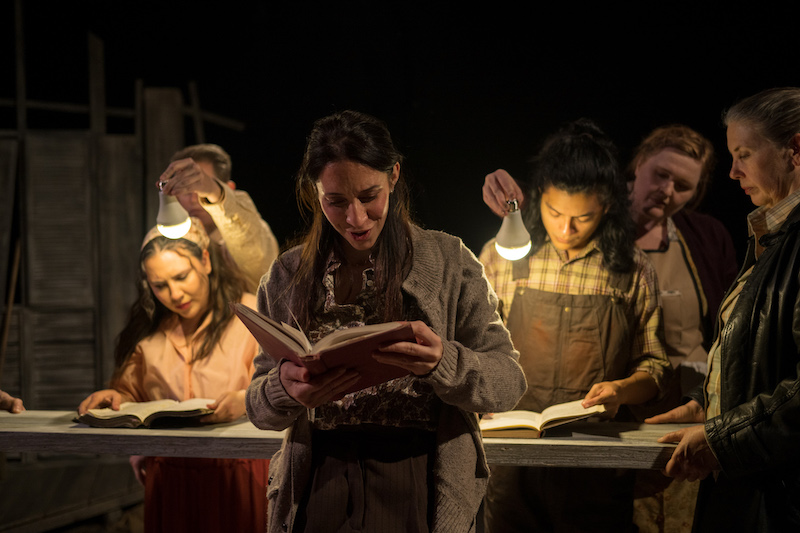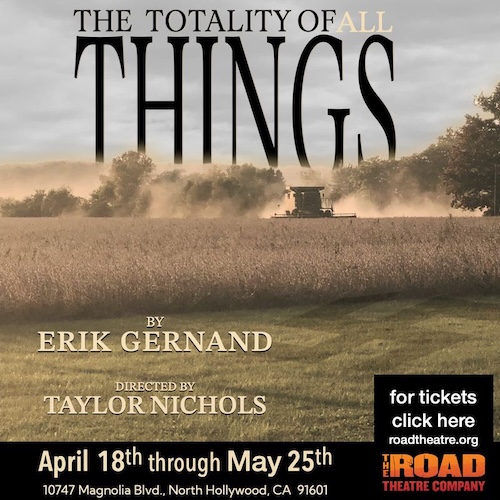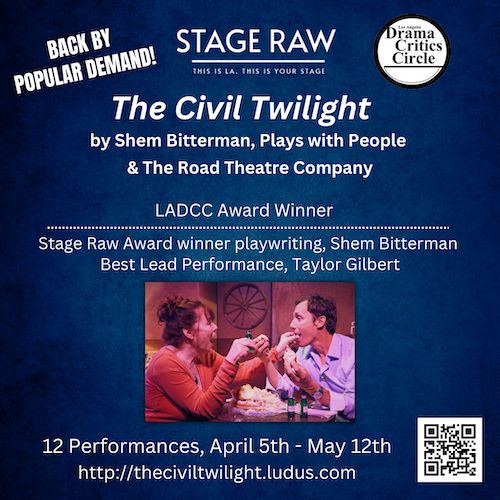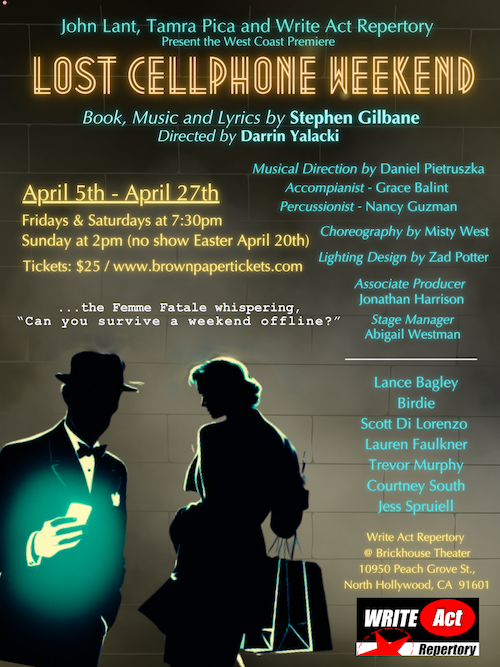The Dry Years
Reviewed by Steven Leigh Morris
Ghost Road Theatre Company at The Broadwater Stage
Through March 4
RECOMMENDED
There’s so much to recommend in Christine Breihan’s staging of John Guerra’s play, even though the work feels in need of one more pass to address some dramaturgical clutter.
Let’s start with the almost gothic beauty of a rural, drought-plagued California valley that has the mythology of the Wild West stamped all over it. This is luminously captured in Katrina Coulourides’ set featuring sun-bleached planks (that Breihan uses imaginatively as props and set pieces) and ramshackle wooden structures that speak to the harshness of the elements. Add to that an ensemble of solid performances.
It would seem that a rainmaker, Hatfield (Ronnie Clark) — the stranger, based on the early 20th century character of Charles Mallory Hatfield, who arrives to save the valley — would be the play’s centerpiece. And in some ways, he is. But this is a story aching to be about storytelling, truth and lies, and these are distinct entities that Guerra’s play conflates.
Hatfield is the ignition for the autobiography that writer Casey (Melissa Paladino) is constructing/reciting for her off-stage daughter, while Casey is haunted by the ghost of her own mother (Liz Eldridge).
Her autobiography involves a rainmaker who passed through the lives of this family. Does Casey, whose falsehoods punctuate this play, tell the truth about her complicity in endangering the life of her naïve brother Paul (Kelvin Morales)? Paul was desperate to assist the quasi-chemist Hatfield and to learn his trade, using toxic chemicals no less. What was Casey imagining? To help save the valley? Or instead to do whatever she could to bring the rain and financial stability that would permit her to resume her college education, curtailed because of the drought and the financial hardship it had brought? All at the cost of her brother’s health, if not his life? Can this storyteller tell the truth? Come clean to her own daughter?
Guerra’s play is at its best when grappling with the power of a story. It resonates far beyond California, where school districts are being pressured to downplay slavery and genocidal policies towards indigenous populations in their teachings of history. Because harping on our darker sides is “unpatriotic.” Yet the stories learned in school forge an identity of a nation, of its triumphs and betrayals. When the President of the United States mentions in his State of the Union address recorded suggestions by his opponents to trim Social Security and Medicare benefits, and he’s met with shrieks of “liar” and “bullshit” by people invested in and promoting long-disproved yet widely believed conspiracy theories, this play’s belief in the transformative power of stories can’t be underestimated. Similarly, there are shouts of “liar” all over this play — entire plot reversals based on that toxic accusation.
But what is a lie and how is it connected to betrayal? This is a question that The Dry Years hasn’t quite sorted out.
Being a reasonable fellow, the family’s living patriarch Isaac (Richard Azurdia) is obsessed with using the justice system to redress the past actions of lawyers who helped funnel the valley’s water away from its farms. He’s just told his daughter that he can no longer pay for her education as he had promised. Have faith in the justice system. Her dream is being deferred, not cancelled, he assures her. Have faith. Does that make him a liar? Is believing in the justice system any less theological than the belief in divine intervention?
He’s heading to Sacramento after an appeal he filed has been approved for a hearing. Hatfield arrives at just about the same time Isaac departs, and Isaac makes it clear he wants nothing to do with this dream-weaver/conman.
But why is Isaac so hostile to the rainmaker? What’s to lose in trying? Are the rainmaker’s efforts at odds with Isaac’s legal strategy? It would seem one has nothing to do with another, yet Isaac presents the decision of fighting in court and pulling rain from the sky as an either/or conundrum. As a few characters in the play point out, it’s not.
Does the rainmaker want money up front? No mention of that. There is a reference to a “contract,” but not its terms. Yet knowing the terms is essential to fathom whether Isaac has such animus towards the rainmaker because he doesn’t want to his hopes crushed, or whether he sees simply sees Hatfield as a conman. (Clark’s performance suggests a grizzled character more world weary and tragic than diabolical — though Casey’s adopted sister, Magda (Camila Rozo), refers to him as diablo.) So Isaac’s reasoning is currently blurry. And a story such as this calls for more precision.
Based on these unfathomable reasons, and in her dad’s absence, Casey tells a lie to the property’s owner, Aunt Faye (Katharine Noon) — that Isaac had a “change of heart,” that he actually wants the rainmaker to work his magical science. And so. with Faye’s reluctant approval and while Isaac is away, Paul helps Hatfield construct a massive wooden tower (very nice stage effects to invoke that construction), and droplets of water come trickling out of buckets. But nothing to write home about, at first. More to the point, Hatfield and Paul start coughing as this story enters the world of La Boheme.
Inevitably (and that inevitability is a good thing for a story like this), Faye discovers Casey’s lie and goes ballistic. “You lied!” she screams, with all the righteous indignation of Marjorie Taylor Greene. Problem is, for Faye, there’s now a contract in place, though we don’t know anything about what that contract entails. Hmmm.
The point around which the plot turns is actually not Casey’s lie, though playwright Guerra would have us believe it is. The issue is about Casey’s betrayal of her own father’s wishes, and of her own brother’s best interests. This is a play that purports to be a story about storytelling and its relationship to lies, but it’s propelled by betrayals, in which lies are mere onramps. Had Casey told those same lies and not done nothing about them, the lies would be irrelevant. And that’s an issue in a play about words and their connection to the stories we tell — to identify who we are.
There’s a kind of fusion, of synthesis, near play’s end, when it settles back on the issue of how Casey should tell her story, and whether or not stories have lives of their own. To paraphrase preacher C.H. Spurgeon: “A lie travels halfway around the world before the truth puts its boots on.”
The lies in The Dry Years that might resonate with timeless relevance are not Casey’s lie to Faye about her dad’s “change of heart,” nor her dad’s original promise to Casey that he would pay for her education without pause. The lies that matter are what she might say about her own actions to her own daughter that she knows are untrue, but make her look better than she otherwise might.
This play comes home when Casey realizes she needs to tell the truth to her daughter. She’s not a pathological liar, like George Santos. She, at least, considers coming clean, and the importance of it. And the importance of the difference between fiction and deceit.
As for the rest, it just needs a broom to sweep away the cobwebs. Guerra’s play is almost there. And this production is gorgeous.
Maybe it’s the way it struck my nerve center. I live in a forest that’s been so plagued by fire and drought, we all wondered if it would ever rain again. And when those clouds roll over, for me, it’s visceral. Cricket Meyers’ sound design has those first drops of rain sounding like beans being dropped one by one, into a tin can. And then as a cluster. I know this sound. The relief and joy of it. And then it doesn’t stop. And the next thing, a few days later, sections of the highway have been washed into the ravine below.
This is all part of a primal, pre-Christian mythology that The Dry Years taps into: earth, wind, fire and water. And it’s absolutely beautiful.
Ghost Road Theatre Company at The Broadwater Stage, 1076 Lillian Way, Hollywood; Thurs.-Sun., 8 pm; thru March 4. https://ghostroad.org












